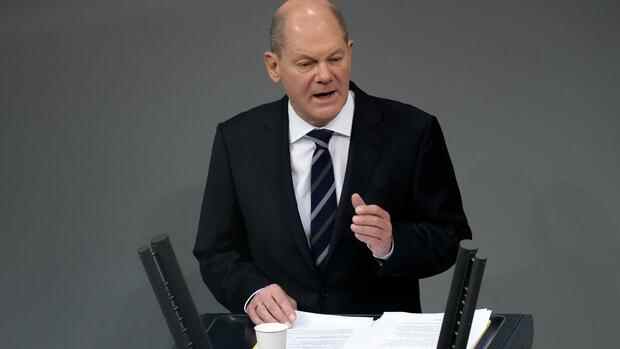Berlin There are 16 years between the two speeches. In her first government declaration on November 30, 2005, Angela Merkel (CDU) promised the citizens “second founding years” in which Germany could come back to the top in Europe. The grand coalition would be a “government of action”, assured the then Chancellor at a time when Germany was being described as the “sick man of Europe” in view of the dramatic unemployment figures.
It promises a government of social, societal and cultural progress, but above all emphasizes technical progress. Only with him can Germany become climate neutral and keep up with global competition.
Two government statements full of ambition, but the same tone. Just like Merkel at the time, Scholz worked his way through the coalition agreement for 90 minutes with little empathy. After all, the topics are not completely the same in the largely monotonous lecture.
Top jobs of the day
Find the best jobs now and
be notified by email.
Merkel wanted “to make the job market fit, to lead schools and universities back to the top, to tame the debt and to put our health and pension system and care in order”. Bureaucracy will also be reduced, said Merkel, and summarized her style of government as follows: “Many will say: This coalition is taking many small steps and not the one big one. And I reply: That’s exactly how we do it. “
Big hit in climate change
According to Scholz, one topic has to be a big hit. “We now have 23 years ahead of us in which we must and will get out of fossil fuels,” he says. “This means that the greatest transformation of our industry and economy in at least 100 years lies ahead of us.”
The traffic turnaround is to become a “central pillar” of its climate policy for the traffic light coalition. Scholz assures: “In the coming years we will ensure that mobility becomes easier, more comfortable and more climate-friendly and that it remains affordable for everyone.”
The government statement by Olaf Scholz is followed by a two-and-a-half hour debate.
(Photo: dpa)
Scholz names the expansion of rail transport as a focus. Big cities will be better connected to long-distance traffic, but also rural areas in general, and disused routes will be reactivated if necessary. He also holds out the prospect of an “expansion and modernization pact” for better local public transport.
At the same time, the new Chancellor is committed to car traffic: “Many like to drive, and it should stay that way.” He is therefore aiming for 15 million electric cars on German roads by 2030.
Scholz proclaims a decade of future investments
With a view to the energy transition, Scholz says that Germany currently consumes around 560 terawatt hours of electricity per year, and by 2030 the demand will increase to up to 750 terawatt hours. 80 percent of this is to be generated from renewable energies, which means that Germany will have to more than double that share by 2030. That is a huge challenge. But: “I am firmly convinced that we will succeed.”
A decade of future investments is now necessary. Most of the should be shouldered by the private sector. That is why “super write-offs” are important in 2022 and 2023 when investing in climate protection and digitization.
The social democrat rules out quick successes in housing construction policy. That is why the rent brake will be extended until 2029. In order to strengthen the supply in the long term, the traffic light coalition will create 400,000 new apartments per year, 100,000 of which are socially subsidized apartments. Too often, especially in big cities, the dream of owning a home does not come true.
On November 30, 2005, the CDU politician made her first government statement in the Bundestag.
(Photo: AP)
In addition to the transformation, there is another big difference to Merkel’s assumption of office: the corona pandemic. Now the course has to be set. “We have no time to lose,” warns the Social Democrat. This applies primarily to the fight against the corona pandemic. December hits the mood anyway with its dark days, and there are currently no atmospheric Christmas markets and convivial Christmas parties, says the 63-year-old.
“I am aware these days it is sometimes difficult not to lose courage,” says Scholz, also with a view to the increasing number of infections, busy hospitals and hundreds of deaths in connection with Corona. The situation is difficult, but the solution is obvious: contact reduction.
“Our democracy is a defensive democracy.”
The Chancellor appeals to the population to reduce contacts and get vaccinated. He affirmed the goal of 30 million vaccinations from mid-November to the end of the year. They are on the right track, they have already had 19 million vaccinations, said Scholz.
Everything will also be done at European level to fight the pandemic. According to Scholz, there are “no red lines” for the federal government. “I will see to it that the necessary measures are taken,” says the Chancellor.
The “power of progress” is particularly evident in the pandemic, added the Chancellor. The corona vaccine developed in Germany saved the lives of millions of people around the world. The vaccine from Biontech is “the best proof that smart progress, smart innovation and smart modernization make the world a better place”.
With a view to some violent anti-vaccination opponents, Scholz affirmed that German society was not divided. Because a large part of the population decided to have a corona vaccination. “We are listening. We’re looking for the debate, ”says Scholz. Germany will not, however, allow the minority to impose their will on the majority. “Our democracy is a defensive democracy.”
16 years after Merkel’s first government declaration, Scholz expressly honors his predecessor. With a view to their services for Germany over the past 16 years and expressly also to the smooth change of government, Scholz says: “Thank you, Ms. Dr. Merkel. “
More: Traffic light coalition approves 176 new jobs
